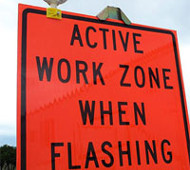10/25/2017
Ninth Circuit Upholds Speeding Stop In Non-Existent Work ZoneUS Court of Appeals allows stops for speeding in work zones as long as the police officer says it was a work zone.

Motorists can be stopped for speeding even when there are no posted signs advising of a lowered speed limit. That was the the view expressed Friday by the Ninth Circuit US Court of Appeals in upholding the conviction of James Pratt, who was pulled over for allegedly speeding in Redding, California on July 12, 2012 at 11:26pm.
On that evening, Shasta County Sheriff's Deputy Chris McQuillan was parked on the side of the freeway watching traffic in his Chevy Tahoe as part of an anti-drug task force. The deputy noted a green 1998 Buick Regal sedan with a license plate from Washington state. According to his Stalker radar gun, the Regal was traveling at 65 MPH, the normal speed limit on this stretch of I-5.
The question before the three-judge appellate panel was whether the speed limit on that night was 65 MPH, or 55 MPH -- as the prosecution argued -- because the location was a work zone. According to California Department of Transportation (CalTrans) documents provided by the prosecution, all of the 65 MPH signs at the location were covered, and temporary signs put up to announcing the speed limit reduction to 55 MPH on Wednesday at 8:20pm. These changes were reversed at 6:30am on Thursday when work on the road shoulder's rumble strip stopped and the lane reopened.
"The government has shown that any lane closures and speed limit reductions on Interstate 5 northbound terminated over sixteen hours before the illegal traffic stop in this case," assistant federal defender Michael Petrik Jr argued. "Surely, the court must find that the government's evidence supports the argument presented in Mr. Pratt's motion to suppress."
The Ninth Circuit panel disagreed, accepting at face value the argument of the prosecution that was presented in written briefs to the court.
"The district court's findings that the interstate highway was under construction, had a reduced speed limit, and that Pratt exceeded the speed limit are supported by the record," the appellate judges wrote in their unpublished memorandum ruling. "The officer's in-dash video depicted construction cones closing off one lane of the highway, as well as a Department of Transportation sign announcing the interstate was under construction. Department of Transportation traffic logs indicated the highway was under construction and had a reduced speed limit of 55 MPH at the time Pratt was pulled over. The officer's radar indicated Pratt was driving 65 MPH."
The logs, however, show a code 10-98 at 6:30am on Thursday, which "Indicates planned lane closure has been completed and lane has been reopened," according to CalTrans. The federal defender's office contacted CalTrans to confirm that the 55 MPH restriction applied that evening to the southbound traffic only, and that no restrictions applied in the direction Pratt was traveling. The deputy's dashcam video also showed a 65 MPH speed limit sign visible just as Pratt signals to pull over.
Because the appellate judges upheld the stop for speeding as legitimate, Pratt's conviction for drug dealing was upheld. The deputy's hunch that evening that Pratt was involved in dealing proved true when the deputy asked for permission to search the vehicle.
"I ain't got nothing to hide, you know what I'm saying," Pratt replied. "I ain't trying to make you suspicious."
As a result of the search, 12.5 pounds of cocaine were found. The district court sentenced Pratt to ten years in prison.
A copy of the Ninth Circuit ruling is available in a 60k PDF file at the source link below.


